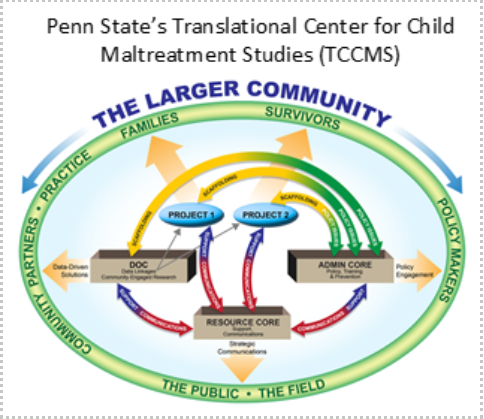P50 NICHD Capstone Center for Excellence

Penn State's Translational Center for Child Maltreatment Studies
The Institute of Medicine and the American Academy of Pediatrics can call for higher caliber research that will truly have a positive and lasting impact in the lives of today’s youth who have been exposed to significant early-life stress. To inspire social change, high-quality science needs to be translated into products and messages that resonate with key stakeholders and broadly communicated to end-users, policy-makers, and the public. The NIH P50 Capstone Center for Excellence mechanism is designed to create a national resource to fully unite these treatises such that the whole of the center is greater than the sum of its parts.
Awarded in 2017, our P50 Center, Penn State’s Translational Center for Child Maltreatment Studies, integrates cutting edge research and supportive cores to accomplish the following Aims:
Aim A. Conduct high quality, translational research that directly impacts youth who encounter the protective service system.
Project 1: The Child Health Study
The Child Health Study (led by Hannah Schreier and Christine Heim) is a prospective, longitudinal cohort study of 525 children who have been exposed to the child welfare system and 175 matched controls aimed at discovering malleable psychosocial, behavioral, and resilient factors that mitigate the impact of early-life stress and stress-mediated mechanisms implicated in problematic physical, mental, and behavioral health outcomes across development.
Project 2 (Phase 1): Implementation Trial of a validated clinical decision rule for pediatric abusive head trauma
Implementation Trial of a validated clinical decision rule for pediatric abusive head trauma (led by Kent Hymel) is a cluster randomized trial in 8 pediatric intensive care units (PICUs) across the country of the effectiveness of an intervention for physicians to aid in their decisions to launch or forego a child abuse investigation via a clinical decision rule. Published results indicated that indeed the behaviors of busy PICU physicians can be changed to increase the number of high-risk abusive head trauma patients being evaluated for abuse. Moreover, these results indicate that a simple, inexpensive, and reliable CDR will decrease physicians’ biases and practice disparities, significantly increasing child abuse detection, decreasing unnecessary abuse evaluations, and reducing abuse-associated health care costs. Most importantly, the intervention will save lives of children who would otherwise suffer additional fatal inflicted injuries if/when their abuse is missed.
Project 2 (Phase 2): Testing the effectiveness of telehealth delivery of forensic evaluations for victims sexual abuse
(Planned for Phase 2 led by Sheridan Miyamoto): is a clinical trial of nurse-led, sexual abuse forensic examiner assistance delivered through telehealth (the SAFE-T model) to rural and underserved hospitals. Much of the rural US experiences marked health disparities due to a lack of resources and health care expertise. Project 2 seeks to address these disparities by bringing medical, legal, and emotional services to rural sexual assault survivors through innovative telehealth solutions.
Aim B. Continue hallmark community-engaged partnerships and, through state-of-the-art communications, disseminate knowledge, strategies, and solutions that reduce disparities and better-protect children.
The Dissemination and Outreach Core (led by Sarah Font and Christian Connell) extends community-engaged research with local and state partners to develop data-driven solutions to impact practice.
The Resource Core (led by Yo Jackson) works to translate TCCMS products for larger dissemination through an innovative communications strategy to:
-
enhance the visibility and impact through public outreach, advancing equal access to practice tools, and
-
disseminate cutting-edge science, evidence-informed policy, and creative solutions
Aim C. Serve as a national resource for scaffolding science to impact policy, for the primary prevention of CM, and for nurturing the next generation in cutting-edge science and translation.
The Admin Core (led by Jennie Noll) scaffolds TCCMS Aims through infrastructure, training, experienced leadership, and high-level exposure.
-
The Admin Core promotes policy engagement and maximize the impact of science to mobilize system-wide change and houses the Research to Policy Collaboration with Policy Co-Directors Taylor Scott and Max Crowley and the Evidence to Impact Collaborative
-
In conjunction with our T32 to TCCMS will equip the next generation to become leaders in unassailable science, to recognize and address disparities in health trajectories and access to care, and to translate policy-relevant science into sustainable solutions.




